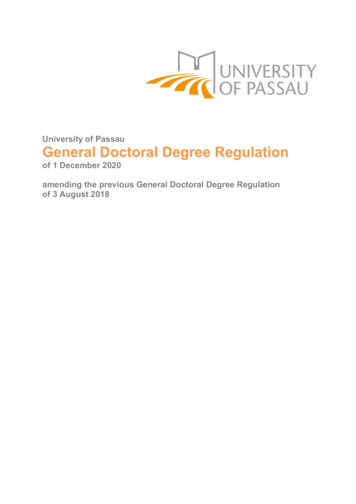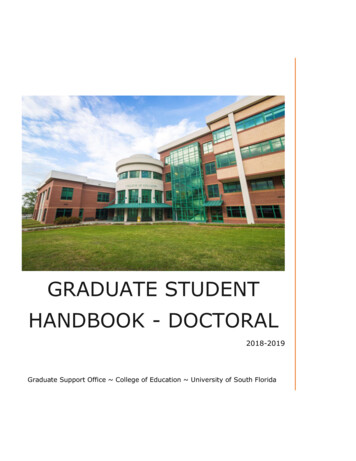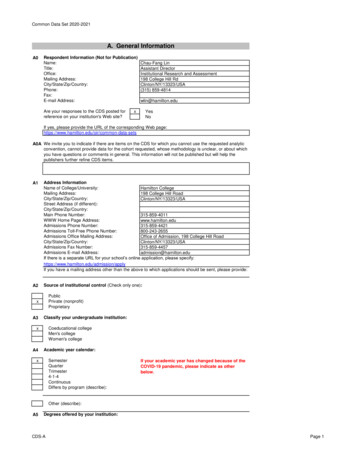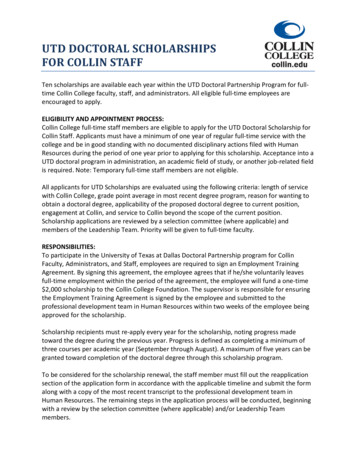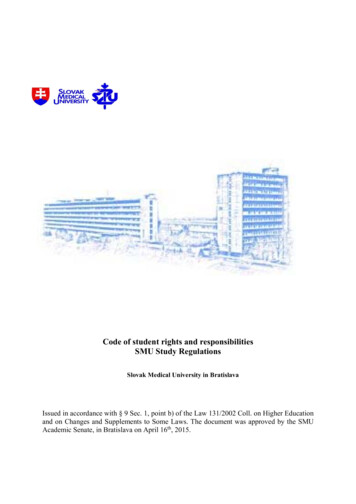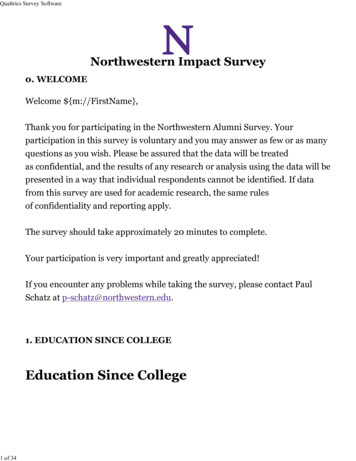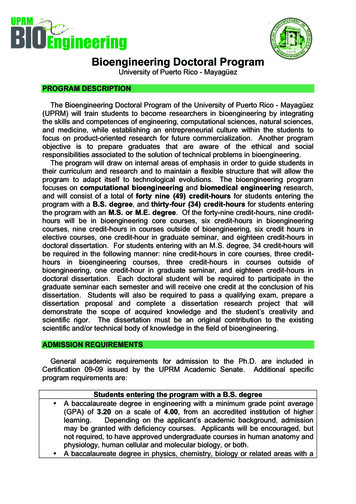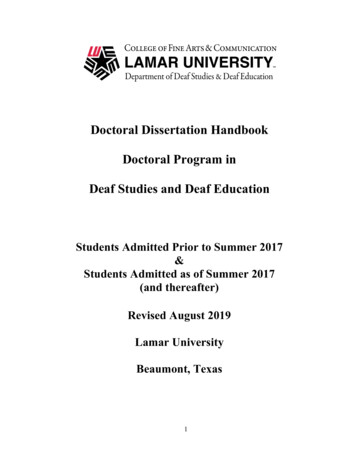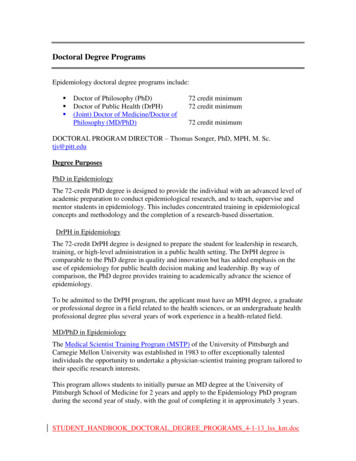
Transcription
Doctoral Degree ProgramsEpidemiology doctoral degree programs include: Doctor of Philosophy (PhD)Doctor of Public Health (DrPH)(Joint) Doctor of Medicine/Doctor ofPhilosophy (MD/PhD)72 credit minimum72 credit minimum72 credit minimumDOCTORAL PROGRAM DIRECTOR – Thomas Songer, PhD, MPH, M. Sc.tjs@pitt.eduDegree PurposesPhD in EpidemiologyThe 72-credit PhD degree is designed to provide the individual with an advanced level ofacademic preparation to conduct epidemiological research, and to teach, supervise andmentor students in epidemiology. This includes concentrated training in epidemiologicalconcepts and methodology and the completion of a research-based dissertation.DrPH in EpidemiologyThe 72-credit DrPH degree is designed to prepare the student for leadership in research,training, or high-level administration in a public health setting. The DrPH degree iscomparable to the PhD degree in quality and innovation but has added emphasis on theuse of epidemiology for public health decision making and leadership. By way ofcomparison, the PhD degree provides training to academically advance the science ofepidemiology.To be admitted to the DrPH program, the applicant must have an MPH degree, a graduateor professional degree in a field related to the health sciences, or an undergraduate healthprofessional degree plus several years of work experience in a health-related field.MD/PhD in EpidemiologyThe Medical Scientist Training Program (MSTP) of the University of Pittsburgh andCarnegie Mellon University was established in 1983 to offer exceptionally talentedindividuals the opportunity to undertake a physician-scientist training program tailored totheir specific research interests.This program allows students to initially pursue an MD degree at the University ofPittsburgh School of Medicine for 2 years and apply to the Epidemiology PhD programduring the second year of study, with the goal of completing it in approximately 3 years.STUDENT HANDBOOK DOCTORAL DEGREE PROGRAMS 4-1-13 lss km.doc
After earning the PhD, students return to the School of Medicine to finish the final 2years of their medical training.Completion Timeframes PhD or DrPH degree completion timeframes vary, but usually are 3 – 6 years, assome students are working professionals while others attend Pitt Public Health ona full time basis.MD/PhD joint degree students generally complete the requirements of bothprograms in 6 – 8 years.Policies concerning statute of limitations (for program completion) and leaves ofabsences are identified in the General Policies & Procedures section of theStudent Handbook.Simultaneous degreesStudents may choose to simultaneously pursue master’s and doctoral degrees. Theyshould consult their academic advisors concerning this option.Students may elect to earn a master’s degree in Epidemiology while pursuing theirdoctoral programs. Similarly, master’s degree students who have successfully completed2 terms in their programs and discussed this with their advisors may be considered foradmission to a doctoral program. Students should e-mail these requests, along with aletter of recommendation and an updated statement of purpose, to the Pitt Public Healthadmissions manager and copy the Epidemiology student services staff.Student services staff will present these requests to the Epidemiology AdmissionsCommittee, who will approve or disapprove them. Students will receive notification oftheir acceptance status from Pitt Public Health Student Affairs.Students may then graduate from GSPH with both master’s and doctoral degrees inEpidemiology, if they apply for graduation from each and complete all programrequirements.DOCTORAL PROGRAM MILESTONE REQUIREMENTSGSPH & Departmental core course requirements A table of all required courses, the Epidemiology Course Cycles document, canbe found in the Curriculum section of the Student Handbook.Examples of course sequences for each degree program can also be found in theCurriculum section.STUDENT HANDBOOK DOCTORAL DEGREE PROGRAMS 4-1-13 lss km.doc
Doctoral Program MilestonesMilestone examinations, experiences and coursework must be successfully completed bydoctoral degree candidates in order to graduate. The Report on Requirements for theDoctoral Degree form is used to process and record milestone completion. This schoolform is further discussed in the Report on Requirements (R on R) form andGraduation sections of the Student Handbook, and may be downloaded from theFrequently Used Forms & Documents page on the departmental website.Generally speaking, R on R forms are completed by faculty mentors when students takemilestones exams, and signed by faculty committees approved for each student afterrequired exams are passed. Forms should then be delivered or forwarded to theEpidemiology Student Services Offices for processing and retention. The onlyexception to this process involves the Preliminary Exam (details are included in thefollowing table).A further explanation of how dissertation work progresses in conjunction with milestonescan be found in the Essay/Thesis/Dissertation Guidelines document on theEpidemiology Web site home page.MILESTONE EXAM/REQUIREMENTCOMPLETION ORDERPreliminary ExamOverview ExamComprehensive ExamFulfilled Research RequirementAdmission to CandidacyFinal DefenseCompletion of GSPH online Exit SurveyGraduation CertificationEXCEPTIONS/NOTESPhD and DrPH R on R form is completedby 1 department-wide committee (insteadof faculty committees for individualstudents)May occur before Comprehensive Exam orbe combined with the Comprehensive atthe discretion of the academic advisorMay be combined with Overview ExamThis milestone is NOT required ofEpidemiology doctoral program studentsRequirements for admission to candidacyare referenced on the Report onRequirements for Doctoral Degree formAll GSPH students planning to graduatemust respond to and submit an online exitsurveyCertification is performed by theEpidemiology Student Affairs ManagerPreliminary ExamSTUDENT HANDBOOK DOCTORAL DEGREE PROGRAMS 4-1-13 lss km.doc
This exam assesses the breadth of students’ knowledge of Epidemiology, studentacademic progress and potential to successfully complete a doctoral program, whilemeasuring ability to apply research methods independently and revealing areas ofweakness in student preparation.Preliminary Exam Procedures and Information Exam Facilitator – Evelyn Talbott, DrPh, MPHo Contact Dr. Talbott at: eot1@pitt.edu.o Exam applicants receive updates from Dr. Talbott concerning preparation,scheduling and results. Eligibilityo Students must: Be admitted into the Department of Epidemiology PhD or DrPHprogram Have completed required prerequisite coursework or acceptableequivalent coursework (see below). Consult with their advisors, and request them to forward notice ofexam authorization to the exam facilitator. Be registered for courses in the term in which the exam is taken.Students taking the exams in March must be registered for at leastone credit in the spring term. Students taking the exam in Augustmust be registered for at least one credit in either the summer orfall terms. Exam Parameterso Exam is writteno Students taking the exam for the first time must take all three sections atone sittingo Three exam sections, including General epidemiology (closed book, in-class) General biostatistics (open book, in-class) Study proposal (take home)General Epidemiology Exam. The General Epidemiology Examassesses knowledge from coursework in epidemiology methods,general epidemiology, clinical trials, etc. Students may bring acalculator and a piece of paper with any formulas, definitions, etc. forreference. This 3-hour exam consists of 55-60 questions which areprimarily multiple choice.STUDENT HANDBOOK DOCTORAL DEGREE PROGRAMS 4-1-13 lss km.doc
General Biostatistics Exam. The General Biostatistics Exam isdeveloped and administered by the Department of Biostatistics andgenerally consists of approximately 10 biostatisticsproblems/questions. Students are generally permitted to respond to 6of these problems/questions of their choice. They should havesuccessfully completed Biostatistics 2041 and 2042 prior to taking theexam.Study proposal. This exam focuses on development of anindependent research proposal that demonstrates an appropriateunderstanding of the rationale and methods for undertaking a study ina given area. The exam includes questions to assess the ability of astudent to critique the current scientific understanding of a publichealth issue. This is a take home exam that students have one week tocomplete. Students in the psychiatric epidemiology area ofconcentration take a different exam than other doctoral students.o Under no circumstances is the student to confer with other epidemiologystudents, his or her advisor or other faculty members. If there is a specificprocedural question, the student should e-mail or contact the chair of thePreliminary Committee for clarification. Exam timeframes/exam repeatso The Preliminary Exams are offered twice a year, typically over springbreak (March) and during the third week in August.Students not passing an exam section may re-take it one time, or they maybe required to take additional coursework prior to being given thisopportunity.o It is required that students who are taking BIOST 2042 and EpidemiologyMethods 1 in spring term wait to take the exams at the August sitting.Exceptions may be granted in extremely limited circumstances.o Pitt Public Health policy does not allow a third exam to be administered (asecond re-take) unless the Department of Epidemiology Chair requeststhis on behalf of a student and receives approval from the GSPH AssistantDean for Student Affairs. The department will notify students of finaldecisions concerning these requests.o Advisors may recommend that a student who is unsuccessful in passing allthree exam sections instead complete requirements for a master’s degree. Recommended prerequisite courses*Success on the exams requires that students have a rigorous understanding of thefundamental epidemiology and biostatistics principles, and can apply them todifferent situations as outlined on the exams. Precedent has shown that studentswho have completed the following courses have performed better on the examsthan those who did not complete these courses:STUDENT HANDBOOK DOCTORAL DEGREE PROGRAMS 4-1-13 lss km.doc
o EPIDEM 2110 - Principles of Epidemiology, or an advanced introductorycourse at another university.o EPIDEM 2180 - Epidemiological Methods 1.o BIOS 2041 & 2042 - Introduction to Statistical Methods 1 & 2, oradvanced comparable courses at another university.o EPIDEM 2920 – Writing in Epidemiology: Manuscripts and Grants.o Additionally, students should consider courses and preparation that helpthem in evaluating epidemiological literature.*Exceptions to the required coursework can be granted for students who completethe equivalent of these courses at other institutions. Students requesting waiversof recommended prerequisite courses should consult with the exam facilitator. Expected characteristics of exam proposals written by studentso Rigorous and well defended study designso Demonstration that the proposed study is feasible and makes senseo Well defended and reasoned sample sizes and an appropriate interpretationof the statistical power available in the studyo Well defined and justified endpoints or outcome variables and welldefined and supported interventions or exposure variables with researchhypotheses and the appropriate analyses of these hypotheses Exam results & reportingo A Report on Requirements for Doctoral Degree form will be completed bythe Department of Epidemiology Preliminary Exam Committee to recordeach PhD student’s passage of the Preliminary Exam. The committee willsubmit the form to the department’s Student Services Office forprocessing. The same department-wide committee assesses theperformance of all doctoral students taking the exam.o The chair of the Preliminary Exam Committee will notify students of theirexam results via e-mail or letter.CREATION OF DOCTORAL COMMITTEES PRIOR TO OTHER MILESTONE EXAMSThe doctoral program committees are comprised of faculty members responsible foradvising students and assessing their performance throughout their dissertation research.Soon after a student has completed the Preliminary Exam milestone, a doctoralcommittee for the Overview Exam, Comprehensive Exam and/or the Final Defense isselected by the primary academic advisor (often selected as the committee chair) whosubmits the proposed list of faculty members via e-mail to Lori Smith, EpidemiologyStudent Affairs Manager and Program Administrator (smithl@edc.pitt.edu) for approval.Committee composition must comply with policy set forth by Pitt Public Health and theSTUDENT HANDBOOK DOCTORAL DEGREE PROGRAMS 4-1-13 lss km.doc
University of Pittsburgh. If departmental approval of committee composition is granted,the proposed composition is forwarded to the Pitt Public Health Assistant Dean forStudent Affairs, Mary Derkach, for her additional approval. Lori Smith will notifycommittee chairs via e-mail if departmental and school-wide approvals have beengranted.When communicating with Lori, faculty should specify in the e-mail subject line that theproposed committee if for the student’s Overview, Comprehensive, and/or Final Defense.The composition of each type of doctoral committee must conform to Pitt Public Healthrequirements.Committee chair/member replacementNew committee composition must be conveyed in writing (via e-mail, letter ormemo) to Lori Smith, Epidemiology Student Affairs Manager and ProgramAdministrator (smithl@edc.pitt.edu) who will approve or disapprove, and forwardthe proposed change to Mary Derkach, Pitt Public Health Assistant Dean forStudent Affairs, for her review and approval. Lori Smith will communicate withfaculty via e-mail when approval on the departmental and school levels is granted.Committee members leaving the university are generally replaced unless thedissertation is almost complete or they have had an essential role on thecommittee. If an essential role has been played, the Pitt Public Health AssistantDean for Student Affairs’ approval should be obtained.Committee chairs leaving the university who cannot be conveniently replaced, arereplaced by a co-chair who must be appointed from within the department, unlessthe Final Oral Defense takes place within a few months of the departure. In thiscase, the appointment of a co-chair is usually waived.Overview ExamAll Doctoral candidates must have their dissertation topic and outline of proposedresearch approved by their doctoral committee. The Overview Meeting is the firstofficial meeting of students with their doctoral committees, and may or may not becombined with the Comprehensive Exam. Eligibility Preliminary Exam must have been passedThe doctoral committee for the Overview must be formed and approved (seeprevious section entitled CREATION OF DOCTORAL COMMITTEES PRIOR TOOTHER MILESTONE EXAMS. A general area for the dissertation must have been chosenLiterature review for the chosen area should be completedSTUDENT HANDBOOK DOCTORAL DEGREE PROGRAMS 4-1-13 lss km.doc
Academic advisor must agree that the student is ready for this examExam Parameterso Oral format for both PhD and DrPH candidateso Committee members provide guidance in shaping the conceptualizationand methodology of the proposed dissertationo Relationship of student project to ongoing departmental projects (if any)must be explainedo Proposal may be to carry out research elsewhere under direct supervisionon person selected by dissertation committee, under special circumstances.This alternative should be discussed with committee chairperson prior toproposal presentation Proposal overview approval/disapproval & reportingo Students obtaining Overview approval are not yet admitted to candidacyfor the doctoral degree, but have made progress towards that goal.o Students not obtaining Overview approval will receive written commentsregarding this assessment from their dissertation committee, includingsuggestions and/or recommendations for action(s) prior to scheduling asecond Overview Exam. If the second attempt to pass the Overview Exam is not successful,students will be unable to continue their current pursuit of adoctoral degree within the department, and may be given theopportunity to earn a master’s degree.o A Report on Requirements for Doctoral Degree form must be completedand submitted to the Student Services Office when the overview proposalis approved. The form should be completed by the committee chair andbrought to the Overview Exam for committee signatures.Comprehensive ExaminationThis examination will be given by a doctoral comprehensive committee to assess studentmastery in his/her chosen area of concentration within the Department of Epidemiologyand depth and breadth of knowledge, as well as the ability to use the research methods ofthe discipline. Eligibilityo Students must have: Passed their PreliminaryExam Completed most or all formal course work requirements Obtained Dissertation Overview approval Comprehensive Exams may be combined with DissertationOverview or Prospectus Meetings at committee discretionSTUDENT HANDBOOK DOCTORAL DEGREE PROGRAMS 4-1-13 lss km.doc
Registered in the term in which the exam is giveno Exam cannot be taken in the same term in which graduation will occur Exam parameterso Exam is oralo Focus is primarily on student knowledge in the area of the dissertationtopic Exam results & reportingo Results must be reported to the Pitt Public Health Assistant Dean forStudent Affairs’ office no later than the last day of the term in which theexam is administered.o A Report on Requirements for Doctoral Degree form must be completedand submitted to the Student Services Office when the exam is passed.The form should be completed by the committee chair and brought to theOverview Exam for committee signatures.Admission To CandidacyAdmission to candidacy for the doctoral degree represents student promotion to the mostadvanced level of graduate study, and provides formal approval to devote exclusiveattention to dissertation research and writing. Candidacy prerequisiteso Full (not provisional) graduate statuso Preliminary Exam passageo Successful dissertation Overview meeting Approval of dissertation proposalo Comprehensive Exam passageo Formal course work completion with minimum 3.0 grade point average Candidacy approval & reportingo A Report on Requirements for Doctoral Degree form must be completedand submitted to the Student Services Office when candidacy status isattained. Refer to Report on Requirements form section of the StudentHandbook for additional instructions. Candidate registration for dissertation research and developmento With their academic advisors’ approval, students may register for one ofthe following two courses to proceed with dissertation research andSTUDENT HANDBOOK DOCTORAL DEGREE PROGRAMS 4-1-13 lss km.doc
writing, depending upon their full or part-time status, and continueprogress in meeting credit and course IDEM3100Research &Dissertationfor S01.0 – 15.0 Full or parttimeCREDITS01.0 – 15.0creditoption.Minimumof 3 isrequired orFTDR3999registrationprior tograduation.Discusscreditstaken withadvisor.Full TimeNo creditsDissertation (0)ResearchOTHERINFORMATIONStudents mayregister forEPIDEM 2210 tobegin work ontheir dissertations(with advisorauthorization) ifthey have not yetpassed all of theseexams:Preliminary orQualifying Exam,ComprehensiveExam andOverview exam.Full or parttimePassage of thePreliminary orQualifying Exam,Overview, and theComprehensiveExam.At thisstage, allrequiredcourseworkfor thedegree maynot becompletedand/or 72creditsmight notyet havebeen earned.Candidatesareconsideredfull-timeCompletion of allcourseworkrequired for thedegree andaccumulation of atleast 72 creditsSubstitutesfor EPIDEM3100 on rateis assessedSTUDENT HANDBOOK DOCTORAL DEGREE PROGRAMS 4-1-13 lss km.doc
Final Oral Dissertation DefenseThis final oral examination may be either a defense of the dissertation, an examination inthe field of the dissertation, or a combination of both. Eligibilityoooo Preliminary Exam passedDissertation Overview approvedComprehensive Exam passedAdmission to candidacy attainedDefense timeframeo Defense should be scheduled at least one or two months before expecteddegree completiono Defense may be scheduled not earlier than two weeks followingsubmission of the dissertationo Defense must be held at least two weeks before: End of the term of graduation Degrees are awarded Students should:o Select a time and place for the defense, and notify Lori Smith, StudentServices Manager and Program Administrator (smithl@edc.pitt.edu) andPitt Public Health Graduation Coordinator, Joanne Pegher(jpegher@pitt.edu) of this information.o Submit final dissertation drafts to committee at least two weeks prior tothe Defenseo Send notices of dissertation defense one month in advance to severalUniversity publications Contact the Pitt Public Health Graduation Coordinator, JoannePegher ( for additional informationo Bring Electronic Theses and Dissertation (ETD) Approval Form (fromStudent Affairs graduation packet) to defense for committee signatures Dissertation Defense Committee chairs should:o Contact the Epidemiology Student Services Office to make arrangementsto pick up student files and request generation of current transcripts. Sincetime is required to generate student transcripts, requests for thesedocuments should be submitted at least one day in advance of the defense.o Bring a completed Report on Requirements for Doctoral Degree form tothe defense in preparation for committee signatures.STUDENT HANDBOOK DOCTORAL DEGREE PROGRAMS 4-1-13 lss km.doc
Dissertation Committeeo Any graduate faculty member may attend and participateo Committee may invite other qualified individuals to participateo Only committee members may be present during the final deliberations Defense/exam results & reportingo The Report on Requirements for Doctoral Degree form must be submittedto the Student Services Office when the Final Oral Defense has beenpassed. Refer to the Graduation section of the Student Handbook foradditional information.OTHER DOCTORAL PROGRAM REQUIRED EXPERIENCESDrPH PracticumDrPH students are expected to fulfill a practicum requirement to gain experience inpublic health practice. Students required to complete a practicum include students whomatriculated in the DrPH program in fall term of 2012 or thereafter.* Students whomatriculated before fall term 2012 are not required to complete a practicum (although it isrecommended).*In rare circumstances, a practicum requirement waiver is granted. Students shoulddiscuss this with their advisors, and be able to provide detailed justification for theirrequest. Eligibilityo Students must have completed two terms of course work in the program: Student responsibilityo Arrange for practicum/internship at an outside organization. Practicumshould involve experience in leadership, advocacy, and communication asappropriate to supplement a student’s prior experience. The minimumduration is 250 hours. The practicum may be a paid or unpaid position.o Identify a practicum preceptoro Register for Epidem 2214 (1-4 credits)o Complete Practicum Placement Approval formo Check practicum/internship web page for additional details and all forms Requirements upon completion of practicumSTUDENT HANDBOOK DOCTORAL DEGREE PROGRAMS 4-1-13 lss km.doc
o Prepare a poster presentationo Complete practicum evaluation form and submit to internship officeo Ensure that practicum preceptor submits evaluation form to internshipoffice.Teaching Practicum (PhD & DrPH)Doctoral students are expected to fulfill a teaching requirement by enrolling in theTeaching Practicum (Epidem 2215). Students must be a TA for an epidemiology courseor for a professor with a primary appointment in the Dept of Epidemiology.Students required to complete a Teaching Practicum include* Students who matriculated in the doctoral program in fall, 2004 and thereafter Students who began an epidemiology masters program before fall, 2004 then wereaccepted into the doctoral program in fall of 2004 or thereafterStudents are not required to complete a Teaching Practicum (although it is recommended)if they matriculated in the doctoral program before fall of 2004*In rare circumstances, a Teaching Practicum requirement waiver is granted. Studentsshould discuss this with their advisors and be able to provide detailed justification fortheir request. If the teaching practicum exemption is approved by advisor, the studentshould ask the Student Services Office staff for assistance with processing an officialwaiver request. Eligibility/course assignments Students must have completed the course for which they will be a TA (oran equivalent course with permission of the instructor)Doctoral students who are non-native speakers of English and whoseundergraduate degree programs were not taught in English (as the officiallanguage of instruction) must take and pass the University’s EnglishComprehensibility Test prior to registering for EPIDEM 2215. Moreinformation about the test is available on the final page of the GeneralPolicies & Procedures section of the Student Handbook.TA positions for required Department courses must be filled beforestudents can register as a TA for an elective courseStudent responsibilityo Contact faculty of selected course to determine if teaching assistance isneeded.STUDENT HANDBOOK DOCTORAL DEGREE PROGRAMS 4-1-13 lss km.doc
o Participate in University seminars/workshops providing teachingassistance training as announced by the department, if course instructorapproves the Teaching Practicum experience request.o Register for 2 credits of EPIDEM 2215 in the Student Services office forthe term in which the Teaching Practicum will be done.o Download a Teaching Practicum Agreement form from the EpidemiologyWeb site. This form identifies parameters of the experience, and must becompleted by the course instructor and signed by both students andinstructors. It may be accessed on the Frequently Used Forms &Documents (Forms) page.o Discuss the experience with the instructor upon completion and completeand sign a Teaching Practicum Student Evaluation form (downloadablefrom the Frequently Used Forms & Documents page of theEpidemiology Web site. This form allows students to document theirassessment of their Teaching Practicum experiences.o Obtain instructor’s signature on the Teaching Practicum StudentEvaluation form.o Remind instructor to complete and sign the Teaching Practicum InstructorEvaluation form. Sign this form after discussing it with the courseinstructor.o Return all forms to the student services offices (A536 or A537 Crabtree)for retention by the department. Instructor responsibilityo Meet with students interested in fulfilling their Teaching Practicumexperiences in their course.o Complete a Teaching Practicum Agreement form specifying theparameters of the experience.o Ensure the TA experience includes lecturing or leading review sessions infront of the class. The amount of work for the TA should be equivalent towork in other 2-credit courses.o TAs should not be used for setting up A/V equipment, photocopying, orother clerical jobs. The teaching practicum is designed to provide studentswith exposure to basic teaching skills, such as preparing lectures, leadingdiscussions, and grading.o Discuss experiences with students at the end of the course.o Complete a Teaching Practicum Instructor Evaluation form at the end ofthe course to document student performance and any suggestions forimprovement.o Obtain student signature on the Instructor Evaluation form.o Enter grade (H [Honors], S [Satisfactory] or U [Unsatisfactory]) into thePeopleSoft grade roster for EPIDEM 2215 during appropriate gradingperiod for current term (entering grades on the Instructor Evaluation formwithout also entering them electronically or via a Grade Change RequestSTUDENT HANDBOOK DOCTORAL DEGREE PROGRAMS 4-1-13 lss km.doc
form will not post them to student records). Student Services staff willnotify faculty when electronic grade rosters are open each term.o Remind students to submit the Teaching Practicum Agreement and bothInstructor and Student Evaluation forms to the Student Services office(A536 or A537 Crabtree) for departmental retention.Competency in Communications (DrPH & PhD)Students matriculating in the fall of 2012 or thereafter are required to submit at least twoabstracts about their research and give at least two oral or poster presentations at Dean’sDay, the Epidemiology Department annual poster session, or scientific conferences.DOCTORAL STUDENT FUNDING OPTIONSGraduate Student Researcher (GSR) positionsGraduate Student Researchers in the Epidemiology Department are doctoral degreecandidates who are receiving financial support from research funds secured by faculty inreturn for duties performed to meet the goals for which the funds were awarded.Candidates interested in obtaining funding must apply for these positions, as describedbelow.The typical GSR arrangement is 20 hours/week of work in exchange for tuition plus aliving stipend. The primary goal of a GSR appointment is to provide financial support tothe graduate student.Most students who enroll in Epidemiology Department doctoral programs do so afterreceiving funding through GSR appointments. However, funding is not guaranteed foraccepted doctoral applicants due to a limited number of GSR positions and thevolume of applications received. Prospective and continuing students should beprepared to rely upon their own sources of financial support
ss_km.doc Doctoral Program Milestones Milestone examinations, experiences and coursework must be successfully completed by doctoral degree candidates in order to graduate. The Report on Requirements for the Doctoral Degree form is used to process and record milestone completion. This school
